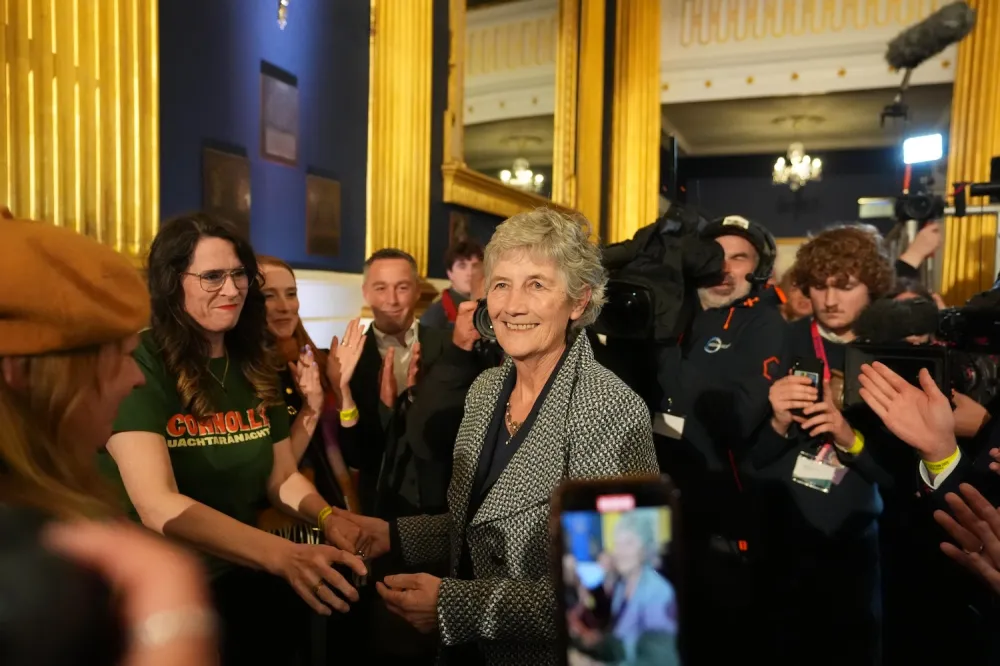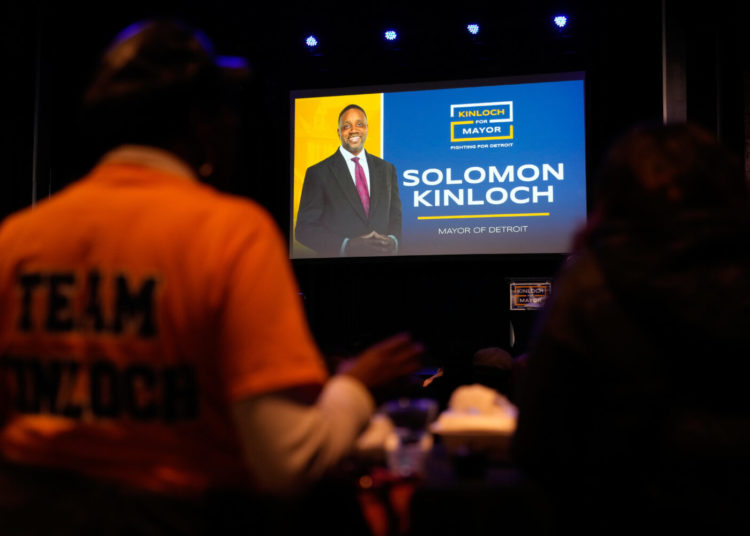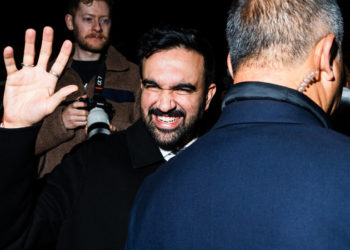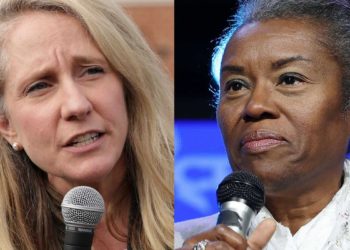In late October, Ireland elected Catherine Connolly as its 10th president to serve a seven-year term beginning on Nov. 11. Connolly, 68, is an independent, left-wing politician—and a former psychologist and barrister who professes to not like politics. Until 2024, she served as the deputy chair of the Dail Eireann, Ireland’s lower house of parliament. Her victory was emphatic: She secured 63.4 percent of the total vote.
The Irish presidency is a largely ceremonial role. On paper, the president is the head of state and the supreme commander of the Irish Defence Forces; the leader formally appoints the government, judges, and the attorney general and signs bills into law. Presidents have no role in selecting those appointments and cannot veto a bill, but they may refer a bill to the Supreme Court if there is concern over its constitutionality (after consulting an advisory body known as the Council of State).
What the office lacks in practical powers it makes up for in meaning. In Ireland, the president is seen as a figure who represents and reflects the country’s values at home and abroad. The Irish electorate tends to prefer calm and deep thinkers, often opting for someone who acts as a philosophical counterpoint to the government, which has been led by the center-right Fine Gael and Fianna Fail—separately or in coalition—for a century.
In this context, Ireland made a statement by choosing Connolly, an anti-war candidate who speaks out against what she calls the “military-industrial complex” and centered Ireland’s large Palestinian solidarity movement in her campaign. Connolly’s election reflects a continued commitment to these values: Outgoing President Michael Higgins is a socialist who has also criticized Israel’s bombardment of Gaza as well as European countries for staying “silent” in the face of civilian suffering.
Domestically, Connolly’s win has united the left, mobilized young voters, and offered a rebuke to the ruling center-right parties. But her victory also reaffirms Ireland’s place as an outlier on the global stage, as it resists a rightward trend in politics and complacency in the face of violence and conflict.
For the first few decades after the office was created in 1937, the Irish presidency was something of a staid domain, primarily occupied by men from the political establishment. In 1990, the role took on a different flavor with the election of Mary Robinson, a 46-year-old human rights lawyer and feminist who went on to become the United Nations high commissioner for human rights. Robinson’s campaign tapped into the social change and liberalization unfolding in Ireland.
The presidency has since shaped itself in Robinson’s mold: as a national conscience speaking out for peace and human rights and a unifying character representing values of equality, civility, and intellectualism. Robinson was followed by Mary McAleese, another activist lawyer and the first president from Northern Ireland. Her election, boosted by a campaign that focused on building bridges between the north and south, came a year before the Good Friday Agreement that signaled an end to the Troubles and most of the sectarian violence in the north.
After McAleese, Ireland elected Higgins, whom the public holds in great affection. Higgins is a committed champion of the arts, a poet, and a deep thinker with a love for Bernese mountain dogs; he recently released a spoken word album set to ambient music titled Against All Certainty. In 2014, he became the first Irish president to make a state visit to the United Kingdom, three years after the first visit by a reigning British monarch to Ireland. Both were seen as landmark moments in Anglo-Irish relations, if mostly symbolic.
Connolly’s vibrant campaign, which she declared a movement, seemed to blend the approaches of the three leaders who came before her—with a slight edge. She spoke about the climate crisis; disability rights; the rights of carers and the vulnerable and marginalized; and of Ireland’s acute housing crisis, which has seen homelessness figures spiral upward and countless young people emigrate despite a near-full employment rate. A self-described pacifist, Connolly is a harsh critic of militarization and a proponent of Ireland’s military neutrality.
Connolly also foregrounded the Palestinian solidarity movement throughout her campaign, condemning the European Union’s response to Israel’s war conduct in Gaza and denouncing the United States for enabling genocide. This is not a controversial sentiment in Irish society. With its history of British colonialism and devastating experience of starvation in the 19th century—known as An Gorta Mor, or the Great Hunger—Ireland has long expressed solidarity with Palestine.
The cause is the largest grassroots movement in Ireland: Protests are frequent, and support for Palestinian freedom is visible in flags and signs across the country. The plight of the Palestinian people is a topic of daily conversation, and controversies light when Irish artists who speak out are censored in other countries. Unlike those in many other European countries or the United States, Irish political parties—and the public—are united in their condemnation of Israel’s military actions; a bill banning the import of goods originating from Israeli settlements in the occupied Palestinian territories is currently making its way through parliament.
Connolly’s vision resonated across Ireland, but she also managed to do something rare in Irish politics: unite the left. The president-elect was endorsed by all the center-left and left-wing opposition parties, including the left-nationalist party Sinn Fein, for which Irish unity is a dominant policy; the Labour Party; the Green Party; the Social Democrats; and the far-left People Before Profit.
Meanwhile, the parties ruling in coalition failed to identify candidates who could present a clear vision for the presidency. The field included just two others: Heather Humphreys, a former Fine Gael minister emerging from retirement, and Jim Gavin, Fianna Fail’s candidate and a former Gaelic football manager who effectively withdrew from the race when a scandal broke about a debt he owned to a former tenant. (Unfortunately for Gavin, that tenant became a senior journalist for a national newspaper.)
Connolly also connected with young people across the country. Her campaign leveraged social media, podcasts, and grassroots fundraising events to generate energy, and she enjoyed almost universal acclaim among popular influencers, artists, and musicians.
During the campaign, Connolly became a figure on which people projected various aspirations: a desire for cohesion among left-wing parties, a celebration of the increasing popularity of the Irish language (which she speaks fluently), and an anti-establishment lust for countering the electoral supremacy of Fine Gael and Fianna Fail. As a culturally attuned working-class woman who grew up in social housing in the suburbs of Galway with 13 siblings, Connolly also provided a feel-good story.
Perhaps most importantly, Connolly’s aspirational vision for a “new republic” tapped into a sentiment of need, particularly espoused by young people, for greater and equal opportunities across housing and services—as well as for a country that acts as a champion for peace by shirking the division and social upheaval conjured by authoritarian forces elsewhere.
For now, Ireland remains an outlier when it comes to global trends in right-wing populism. As the United States and various European countries shift rightward—including the United Kingdom, where the populist Reform UK party is surging in popularity—Connolly’s victory signals that Ireland can and often does do things differently.
Even as right-wing forces scramble for attention, such sentiments are not popular among the Irish public. The traditional right is rooted in Ireland’s 20th-century brand of Catholic conservatism, but the moral and societal authority of the church within Ireland has depleted dramatically in recent decades due to child sex abuse scandals, social liberalization, and the impact of relatively affordable university education.
There is therefore no significant right-wing populist political party in Ireland that models or expresses itself in the shape of the contemporary global right.
Ireland is experiencing some disruption and violence from the country’s far right, a small, disparate movement that leverages the housing crisis to seed anti-immigrant sentiment and espouse so-called traditional Catholic values. This trend has ripple effects in mainstream politics: In the aftermath of the presidential election, for example, Fine Gael leader Simon Harris began hardening his line on immigration in media interviews.
Ultimately, Connolly’s more pointed remarks—her criticisms of NATO, her disdain for European rearmament, her desire for Irish unity, and her admonishment of government housing policy—will be constrained by the office. In Ireland, the president generally refrains from critiquing government. That said, Higgins became increasingly vocal in his second term, labeling the housing crisis in Ireland a “great failure” and often ruffling the feathers of politicians (and some conservative commentators) who felt that he was stretching the presidency to its limit.
Connolly has previously demonstrated the kind of restraint necessary for the office, noted for her calmness on the campaign trail and sidestepping debate questions about whether she would raise her position on the United States arming Israel should she meet U.S. President Donald Trump. It is likely, however, that she will continue Higgins’s habit of speaking out, at least on some of the issues that she was vocal about during her campaign—particularly on Ireland’s neutrality, which is a matter of public and political debate, particularly in the context of Russian aggression and hybrid warfare in Europe.
As the left-wing bloc of opposition parties revels in Connolly’s victory as a signal of broader change, and as momentum for a potential left-wing government builds, Ireland continues to buck trends in both European politics and globally. Connolly’s personal politics and mode of campaigning are evidence that progressive left-wing voices can still rise up. In the Irish case, at least, it was the center right that was left behind—and beyond an ultimately fruitless movement to spoil ballots, the far right wasn’t present at all.
The post Ireland’s Next President Will Assume the Progressive Mantle appeared first on Foreign Policy.




